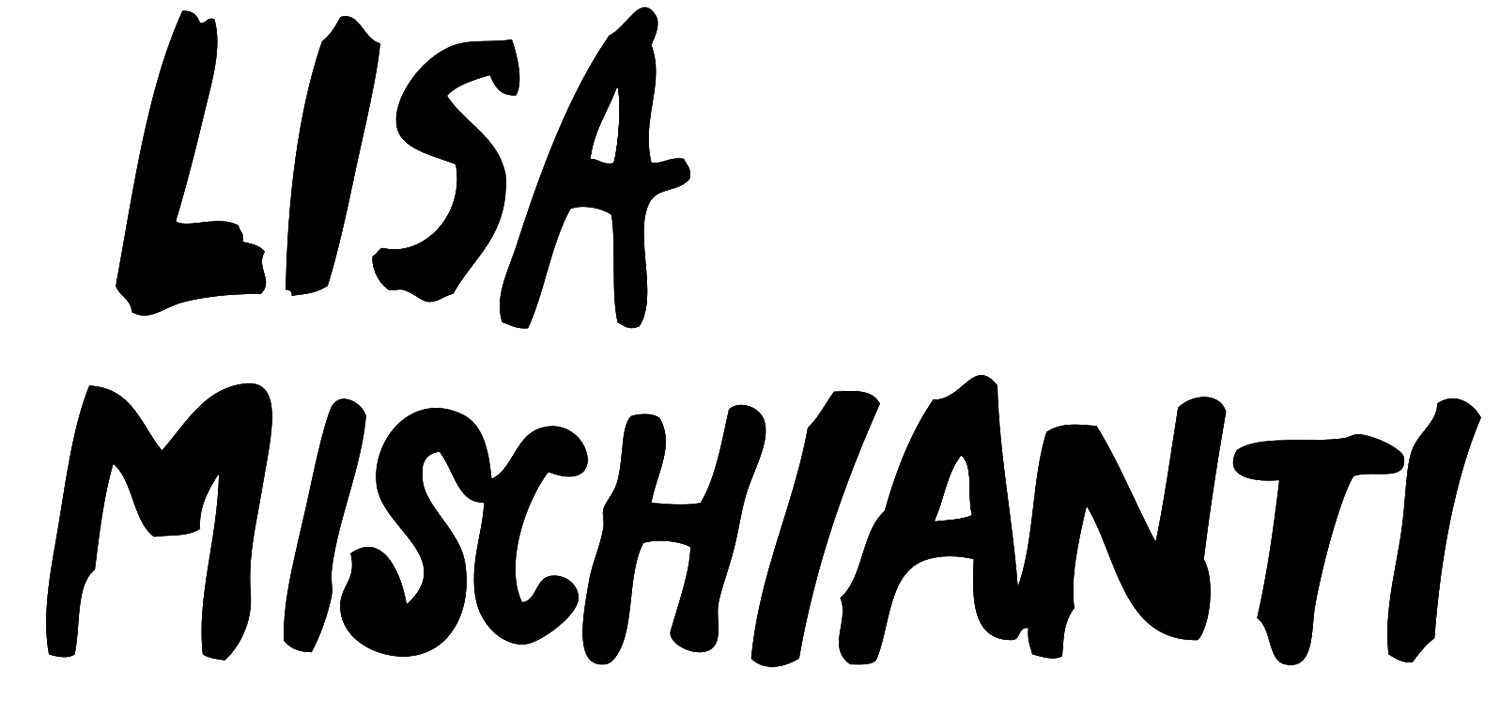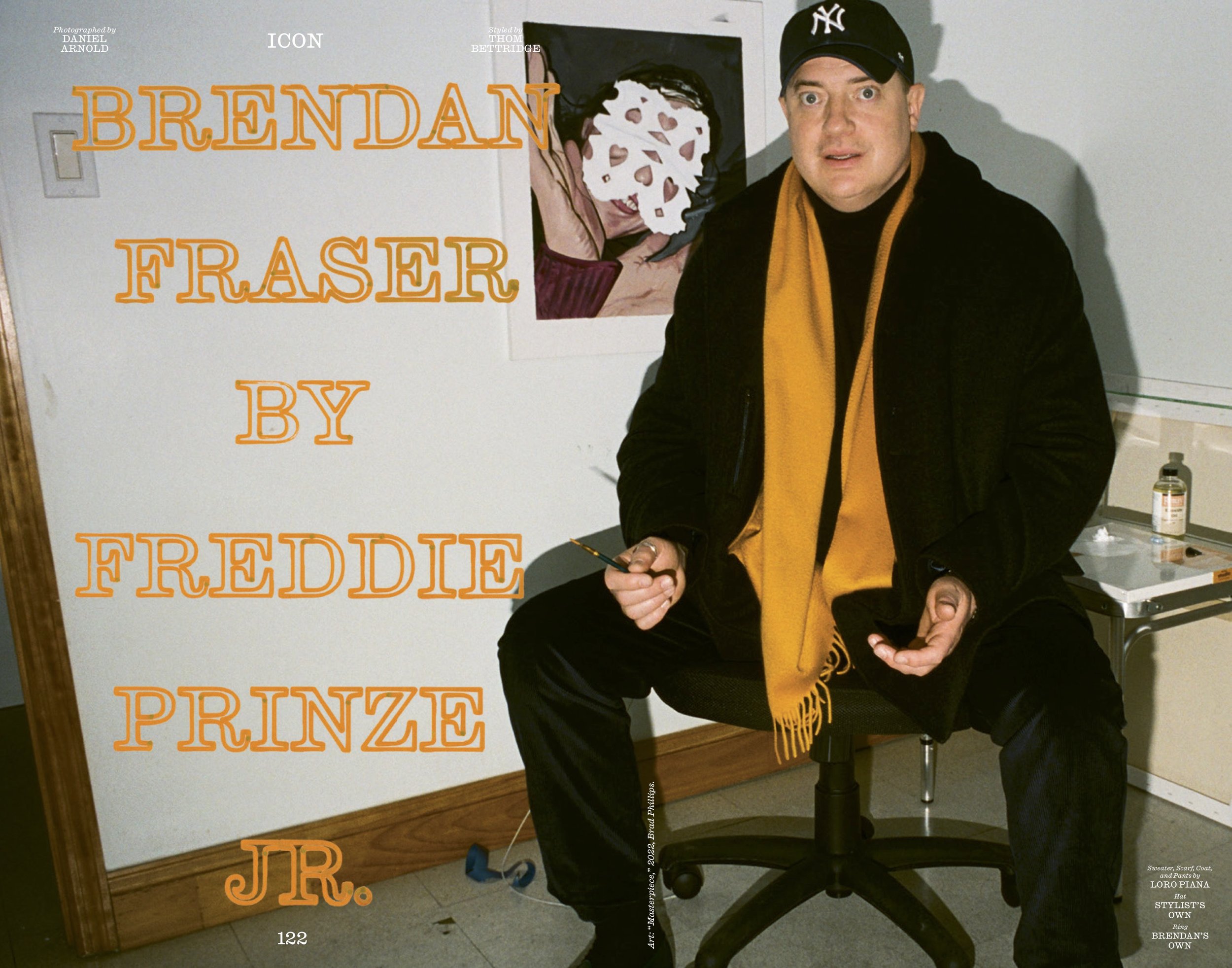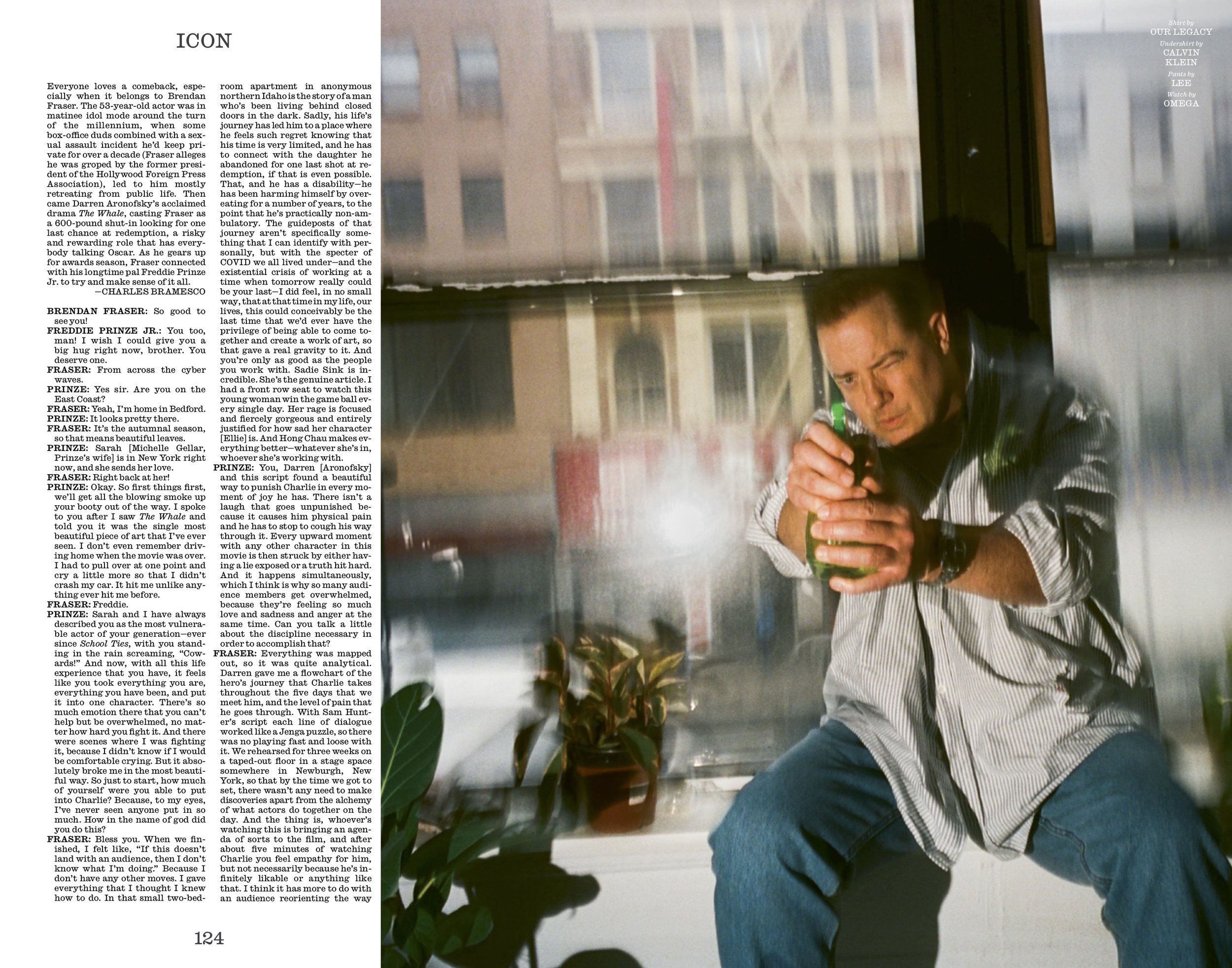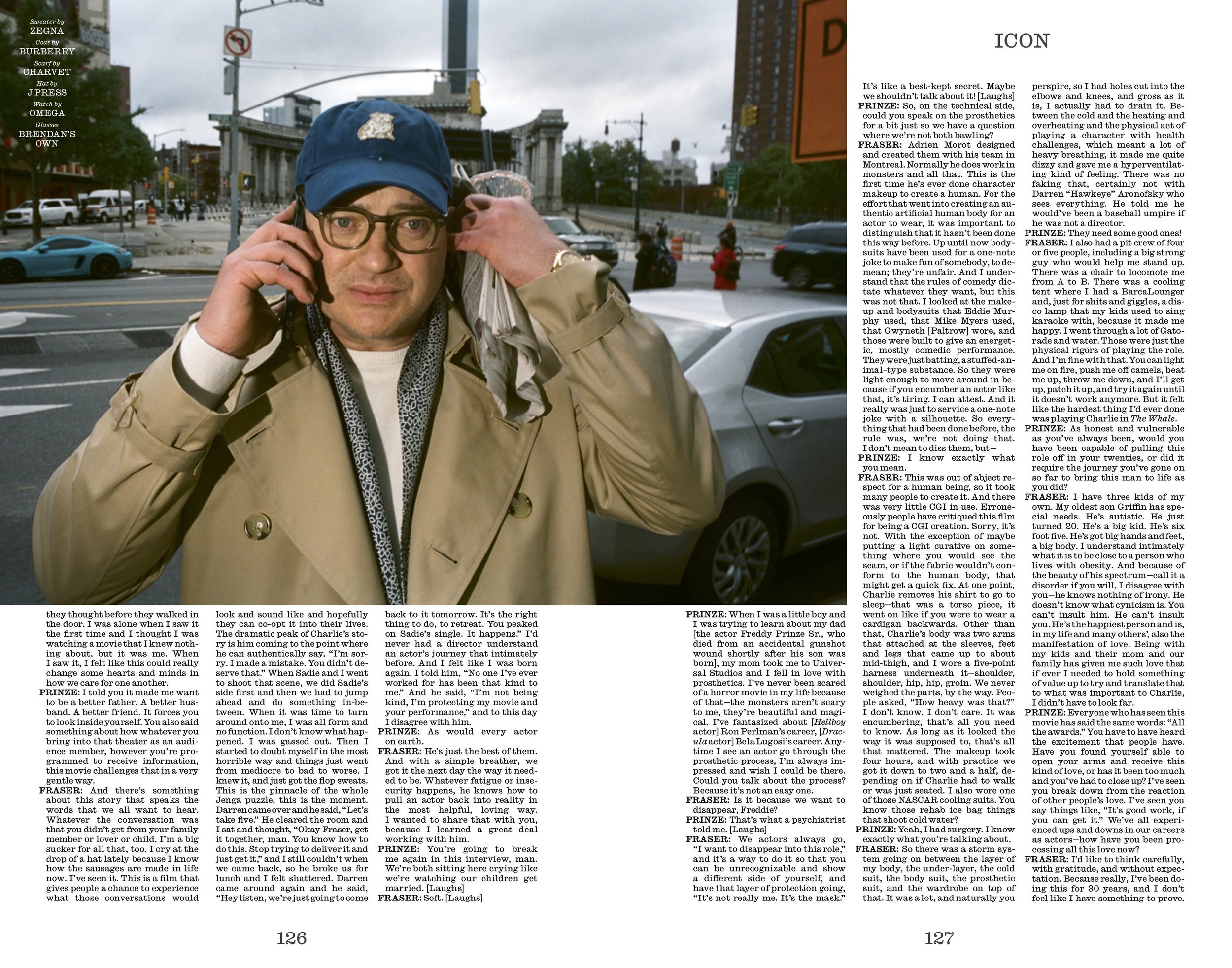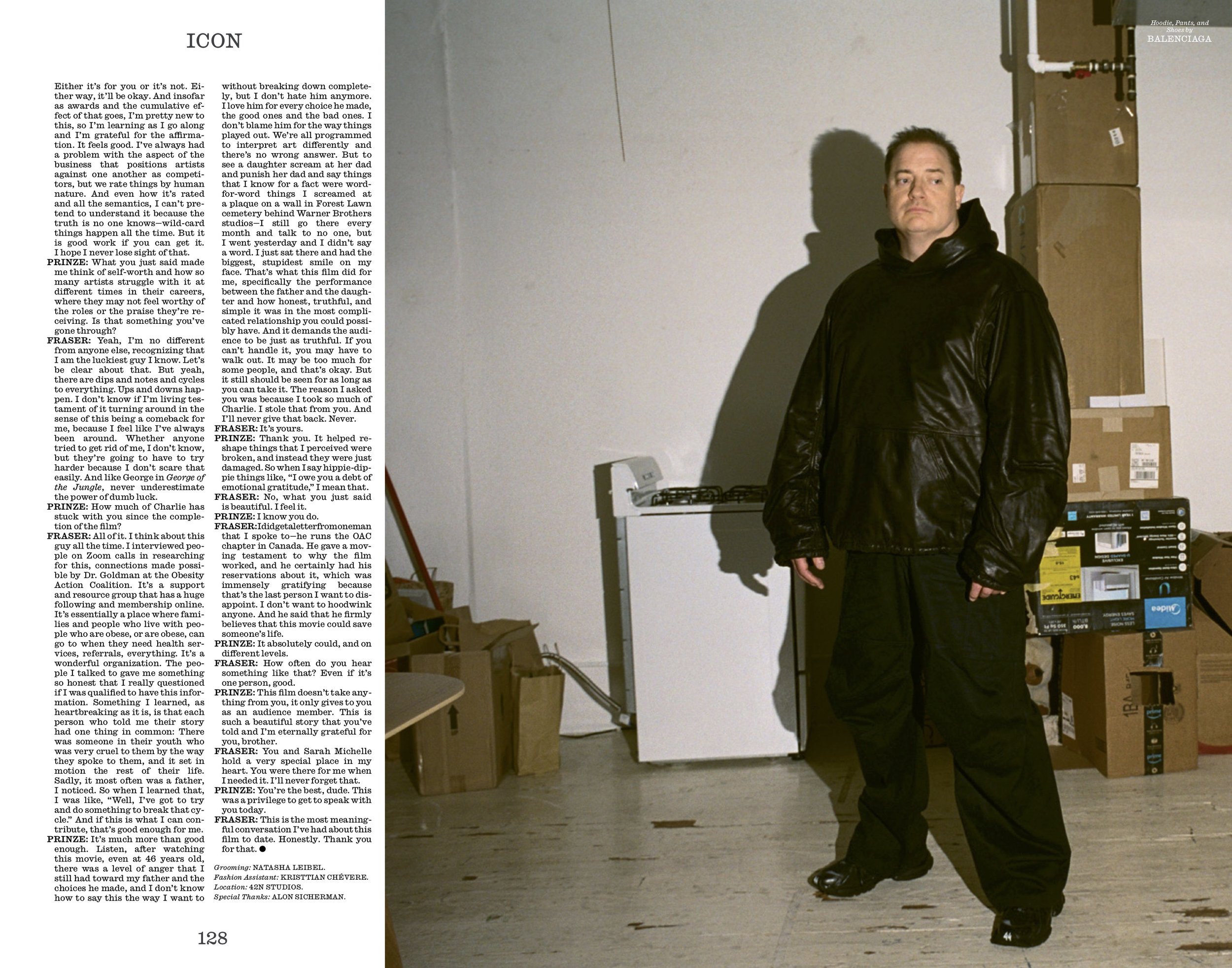BRENDAN FRASER X FREDDIE PRINZE JR.
Everyone loves a comeback, especially when it belongs to Brendan Fraser. The 53-year-old actor was in matinee idol mode around the turn of the millennium, when some box-office duds combined with a sexual assault incident he’d keep private for over a decade (Fraser alleges he was groped by the former president of the Hollywood Foreign Press Association), led to him mostly retreating from public life. Then came Darren Aronofsky’s acclaimed drama The Whale, casting Fraser as a 600-pound shut-in looking for one last chance at redemption, a risky and rewarding role that has everybody talking Oscar. As he gears up for awards season, Fraser connected with his longtime pal Freddie Prinze Jr. to try and make sense of it all. —CHARLES BRAMESCO
BRENDAN FRASER: So good to see you!
FREDDIE PRINZE JR.: You too, man! I wish I could give you a big hug right now, brother. You deserve one.
FRASER: From across the cyber waves.
PRINZE: Yes sir. Are you on the East Coast?
FRASER: Yeah, I’m home in Bedford.
PRINZE: It looks pretty there.
FRASER: It’s the autumnal season, so that means beautiful leaves.
PRINZE: Sarah [Michelle Gellar, Prinze’s wife] is in New York right now, and she sends her love.
FRASER: Right back at her!
PRINZE: Okay. So first things first, we’ll get all the blowing smoke up your booty out of the way. I spoke to you after I saw The Whale and told you it was the single most beautiful piece of art that I’ve ever seen. I don’t even remember driving home when the movie was over. I had to pull over at one point and cry a little more so that I didn’t crash my car. It hit me unlike anything ever hit me before.
FRASER: Freddie.
PRINZE: Sarah and I have always described you as the most vulnerable actor of your generation—ever since School Ties, with you standing in the rain screaming, “Cowards!” And now, with all this life experience that you have, it feels like you took everything you are, everything you have been, and put it into one character. There’s so much emotion there that you can’t help but be overwhelmed, no matter how hard you fight it. And there were scenes where I was fighting it, because I didn’t know if I would be comfortable crying. But it absolutely broke me in the most beautiful way. So just to start, how much of yourself were you able to put into Charlie? Because, to my eyes, I’ve never seen anyone put in so much. How in the name of god did you do this?
FRASER: Bless you. When we finished, I felt like, “If this doesn’t land with an audience, then I don’t know what I’m doing.” Because I don’t have any other moves. I gave everything that I thought I knew how to do. In that small two-bedroom apartment in anonymous northern Idaho is the story of a man who’s been living behind closed doors in the dark. Sadly, his life’s journey has led him to a place where he feels such regret knowing that his time is very limited, and he has to connect with the daughter he abandoned for one last shot at redemption, if that is even possible. That, and he has a disability—he has been harming himself by overeating for a number of years, to the point that he’s practically non-ambulatory. The guideposts of that journey aren’t specifically something that I can identify with personally, but with the specter of COVID we all lived under—and the existential crisis of working at a time when tomorrow really could be your last—I did feel, in no small way, that at that time in my life, our lives, this could conceivably be the last time that we’d ever have the privilege of being able to come together and create a work of art, so that gave a real gravity to it. And you’re only as good as the people you work with. Sadie Sink is incredible. She’s the genuine article. I had a front row seat to watch this young woman win the game ball every single day. Her rage is focused and fiercely gorgeous and entirely justified for how sad her character [Ellie] is. And Hong Chau makes everything better—whatever she’s in, whoever she’s working with.
PRINZE: You, Darren [Aronofsky] and this script found a beautiful way to punish Charlie in every moment of joy he has. There isn’t a laugh that goes unpunished because it causes him physical pain and he has to stop to cough his way through it. Every upward moment with any other character in this movie is then struck by either having a lie exposed or a truth hit hard. And it happens simultaneously, which I think is why so many audience members get overwhelmed, because they’re feeling so much love and sadness and anger at the same time. Can you talk a little about the discipline necessary in order to accomplish that?
FRASER: Everything was mapped out, so it was quite analytical. Darren gave me a flowchart of the hero’s journey that Charlie takes throughout the five days that we meet him, and the level of pain that he goes through. With Sam Hunter’s script each line of dialogue worked like a Jenga puzzle, so there was no playing fast and loose with it. We rehearsed for three weeks on a taped-out floor in a stage space somewhere in Newburgh, New York, so that by the time we got to set, there wasn’t any need to make discoveries apart from the alchemy of what actors do together on the day. And the thing is, whoever’s watching this is bringing an agenda of sorts to the film, and after about five minutes of watching Charlie you feel empathy for him, but not necessarily because he’s infinitely likable or anything like that. I think it has more to do with an audience reorienting the way they thought before they walked in the door. I was alone when I saw it the first time and I thought I was watching a movie that I knew nothing about, but it was me. When I saw it, I felt like this could really change some hearts and minds in how we care for one another.
PRINZE: I told you it made me want to be a better father. A better husband. A better friend. It forces you to look inside yourself. You also said something about how whatever you bring into that theater as an audience member, however you’re programmed to receive information, this movie challenges that in a very gentle way.
FRASER: And there’s something about this story that speaks the words that we all want to hear. Whatever the conversation was that you didn’t get from your family member or lover or child. I’m a big sucker for all that, too. I cry at the drop of a hat lately because I know how the sausages are made in life now. I’ve seen it. This is a film that gives people a chance to experience what those conversations would look and sound like and hopefully they can co-opt it into their lives. The dramatic peak of Charlie’s story is him coming to the point where he can authentically say, “I’m sorry. I made a mistake. You didn’t deserve that.” When Sadie and I went to shoot that scene, we did Sadie’s side first and then we had to jump ahead and do something in-between. When it was time to turn around onto me, I was all form and no function. I don’t know what happened. I was gassed out. Then I started to doubt myself in the most horrible way and things just went from mediocre to bad to worse. I knew it, and just got the flop sweats. This is the pinnacle of the whole Jenga puzzle, this is the moment. Darren came over and he said, “Let’s take five.” He cleared the room and I sat and thought, “Okay Fraser, get it together, man. You know how to do this. Stop trying to deliver it and just get it,” and I still couldn’t when we came back, so he broke us for lunch and I felt shattered. Darren came around again and he said, “Hey listen, we’re just going to come back to it tomorrow. It’s the right thing to do, to retreat. You peaked on Sadie’s single. It happens.” I’d never had a director understand an actor’s journey that intimately before. And I felt like I was born again. I told him, “No one I’ve ever worked for has been that kind to me.” And he said, “I’m not being kind, I’m protecting my movie and your performance,” and to this day I disagree with him.
PRINZE: As would every actor on earth.
FRASER: He’s just the best of them. And with a simple breather, we got it the next day the way it needed to be. Whatever fatigue or insecurity happens, he knows how to pull an actor back into reality in the most helpful, loving way. I wanted to share that with you, because I learned a great deal working with him.
PRINZE: You’re going to break me again in this interview, man. We’re both sitting here crying like we’re watching our children get married. [Laughs]
FRASER: Soft. [Laughs]
PRINZE: When I was a little boy and I was trying to learn about my dad [the actor Freddy Prinze Sr., who died from an accidental gunshot wound shortly after his son was born], my mom took me to Universal Studios and I fell in love with prosthetics. I’ve never been scared of a horror movie in my life because of that—the monsters aren’t scary to me, they’re beautiful and magical. I’ve fantasized about [Hellboy actor] Ron Perlman’s career, [Dracula actor] Bela Lugosi’s career. Anytime I see an actor go through the prosthetic process, I’m always impressed and wish I could be there. Could you talk about the process? Because it’s not an easy one.
FRASER: Is it because we want to disappear, Freddie?
PRINZE: That’s what a psychiatrist told me. [Laughs]
FRASER: We actors always go, “I want to disappear into this role,” and it’s a way to do it so that you can be unrecognizable and show a different side of yourself, and have that layer of protection going, “It’s not really me. It’s the mask.” It’s like a best-kept secret. Maybe we shouldn’t talk about it! [Laughs]
PRINZE: So, on the technical side, could you speak on the prosthetics for a bit just so we have a question where we’re not both bawling?
FRASER: Adrien Morot designed and created them with his team in Montreal. Normally he does work in monsters and all that. This is the first time he’s ever done character makeup to create a human. For the effort that went into creating an authentic artificial human body for an actor to wear, it was important to distinguish that it hasn’t been done this way before. Up until now bodysuits have been used for a one-note joke to make fun of somebody, to demean; they’re unfair. And I understand that the rules of comedy dictate whatever they want, but this was not that. I looked at the makeup and bodysuits that Eddie Murphy used, that Mike Myers used, that Gwyneth [Paltrow] wore, and those were built to give an energetic, mostly comedic performance. They were just batting, a stuffed-animal–type substance. So they were light enough to move around in because if you encumber an actor like that, it’s tiring. I can attest. And it really was just to service a one-note joke with a silhouette. So everything that had been done before, the rule was, we’re not doing that. I don’t mean to diss them, but—
PRINZE: I know exactly what you mean.
FRASER: This was out of abject respect for a human being, so it took many people to create it. And there was very little CGI in use. Erroneously people have critiqued this film for being a CGI creation. Sorry, it’s not. With the exception of maybe putting a light curative on something where you would see the seam, or if the fabric wouldn’t conform to the human body, that might get a quick fix. At one point, Charlie removes his shirt to go to sleep—that was a torso piece, it went on like if you were to wear a cardigan backwards. Other than that, Charlie’s body was two arms that attached at the sleeves, feet and legs that came up to about mid-thigh, and I wore a five-point harness underneath it—shoulder, shoulder, hip, hip, groin. We never weighed the parts, by the way. People asked, “How heavy was that?” I don’t know. I don’t care. It was encumbering, that’s all you need to know. As long as it looked the way it was supposed to, that’s all that mattered. The makeup took four hours, and with practice we got it down to two and a half, depending on if Charlie had to walk or was just seated. I also wore one of those NASCAR cooling suits. You know those rehab ice bag things that shoot cold water?
PRINZE: Yeah, I had surgery. I know exactly what you’re talking about.
FRASER: So there was a storm system going on between the layer of my body, the under-layer, the cold suit, the body suit, the prosthetic suit, and the wardrobe on top of that. It was a lot, and naturally you perspire, so I had holes cut into the elbows and knees, and gross as it is, I actually had to drain it. Between the cold and the heating and overheating and the physical act of playing a character with health challenges, which meant a lot of heavy breathing, it made me quite dizzy and gave me a hyperventilating kind of feeling. There was no faking that, certainly not with Darren “Hawkeye” Aronofsky who sees everything. He told me he would’ve been a baseball umpire if he was not a director.
PRINZE: They need some good ones!
FRASER: I also had a pit crew of four or five people, including a big strong guy who would help me stand up. There was a chair to locomote me from A to B. There was a cooling tent where I had a BarcaLounger and, just for shits and giggles, a disco lamp that my kids used to sing karaoke with, because it made me happy. I went through a lot of Gatorade and water. Those were just the physical rigors of playing the role. And I’m fine with that. You can light me on fire, push me off camels, beat me up, throw me down, and I’ll get up, patch it up, and try it again until it doesn’t work anymore. But it felt like the hardest thing I’d ever done was playing Charlie in The Whale.
PRINZE: As honest and vulnerable as you’ve always been, would you have been capable of pulling this role off in your twenties, or did it require the journey you’ve gone on so far to bring this man to life as you did?
FRASER: I have three kids of my own. My oldest son Griffin has special needs. He’s autistic. He just turned 20. He’s a big kid. He’s six foot five. He’s got big hands and feet, a big body. I understand intimately what it is to be close to a person who lives with obesity. And because of the beauty of his spectrum—call it a disorder if you will, I disagree with you—he knows nothing of irony. He doesn’t know what cynicism is. You can’t insult him. He can’t insult you. He’s the happiest person and is, in my life and many others’, also the manifestation of love. Being with my kids and their mom and our family has given me such love that if ever I needed to hold something of value up to try and translate that to what was important to Charlie, I didn’t have to look far.
PRINZE: Everyone who has seen this movie has said the same words: “All the awards.” You have to have heard the excitement that people have. Have you found yourself able to open your arms and receive this kind of love, or has it been too much and you’ve had to close up? I’ve seen you break down from the reaction of other people’s love. I’ve seen you say things like, “It’s good work, if you can get it.” We’ve all experienced ups and downs in our careers as actors—how have you been processing all this love now?
FRASER: I’d like to think carefully, with gratitude, and without expectation. Because really, I’ve been doing this for 30 years, and I don’t feel like I have something to prove.
Either it’s for you or it’s not. Either way, it’ll be okay. And insofar as awards and the cumulative effect of that goes, I’m pretty new to this, so I’m learning as I go along and I’m grateful for the affirmation. It feels good. I’ve always had a problem with the aspect of the business that positions artists against one another as competitors, but we rate things by human nature. And even how it’s rated and all the semantics, I can’t pretend to understand it because the truth is no one knows—wild-card things happen all the time. But it is good work if you can get it. I hope I never lose sight of that.
PRINZE: What you just said made me think of self-worth and how so many artists struggle with it at different times in their careers, where they may not feel worthy of the roles or the praise they’re receiving. Is that something you’ve gone through?
FRASER: Yeah, I’m no different from anyone else, recognizing that I am the luckiest guy I know. Let’s be clear about that. But yeah, there are dips and notes and cycles to everything. Ups and downs happen. I don’t know if I’m living testament of it turning around in the sense of this being a comeback for me, because I feel like I’ve always been around. Whether anyone tried to get rid of me, I don’t know, but they’re going to have to try harder because I don’t scare that easily. And like George in George of the Jungle, never underestimate the power of dumb luck.
PRINZE: How much of Charlie has stuck with you since the completion of the film?
FRASER: All of it. I think about this guy all the time. I interviewed people on Zoom calls in researching for this, connections made possible by Dr. Goldman at the Obesity Action Coalition. It’s a support and resource group that has a huge following and membership online. It’s essentially a place where families and people who live with people who are obese, or are obese, can go to when they need health services, referrals, everything. It’s a wonderful organization. The people I talked to gave me something so honest that I really questioned if I was qualified to have this information. Something I learned, as heartbreaking as it is, is that each person who told me their story had one thing in common: There was someone in their youth who was very cruel to them by the way they spoke to them, and it set in motion the rest of their life. Sadly, it most often was a father, I noticed. So when I learned that, I was like, “Well, I’ve got to try and do something to break that cycle.” And if this is what I can contribute, that’s good enough for me.
PRINZE: It’s much more than good enough. Listen, after watching this movie, even at 46 years old, there was a level of anger that I still had toward my father and the choices he made, and I don’t know how to say this the way I want to without breaking down completely, but I don’t hate him anymore. I love him for every choice he made, the good ones and the bad ones. I don’t blame him for the way things played out. We’re all programmed to interpret art differently and there’s no wrong answer. But to see a daughter scream at her dad and punish her dad and say things that I know for a fact were word-for-word things I screamed at a plaque on a wall in Forest Lawn cemetery behind Warner Brothers studios—I still go there every month and talk to no one, but I went yesterday and I didn’t say a word. I just sat there and had the biggest, stupidest smile on my face. That’s what this film did for me, specifically the performance between the father and the daughter and how honest, truthful, and simple it was in the most complicated relationship you could possibly have. And it demands the audience to be just as truthful. If you can’t handle it, you may have to walk out. It may be too much for some people, and that’s okay. But it still should be seen for as long as you can take it. The reason I asked you was because I took so much of Charlie. I stole that from you. And I’ll never give that back. Never.
FRASER: It’s yours.
PRINZE: Thank you. It helped reshape things that I perceived were broken, and instead they were just damaged. So when I say hippie-dippie things like, “I owe you a debt of emotional gratitude,” I mean that.
FRASER: No, what you just said is beautiful. I feel it.
PRINZE: I know you do.
FRASER: I did get a letter from one man that I spoke to—he runs the OAC chapter in Canada. He gave a moving testament to why the film worked, and he certainly had his reservations about it, which was immensely gratifying because that’s the last person I want to disappoint. I don’t want to hoodwink anyone. And he said that he firmly believes that this movie could save someone’s life.
PRINZE: It absolutely could, and on different levels.
FRASER: How often do you hear something like that? Even if it’s one person, good.
PRINZE: This film doesn’t take anything from you, it only gives to you as an audience member. This is such a beautiful story that you’ve told and I’m eternally grateful for you, brother.
FRASER: You and Sarah Michelle hold a very special place in my heart. You were there for me when I needed it. I’ll never forget that.
PRINZE: You’re the best, dude. This was a privilege to get to speak with you today.
FRASER: This is the most meaningful conversation I’ve had about this film to date. Honestly. Thank you for that.
